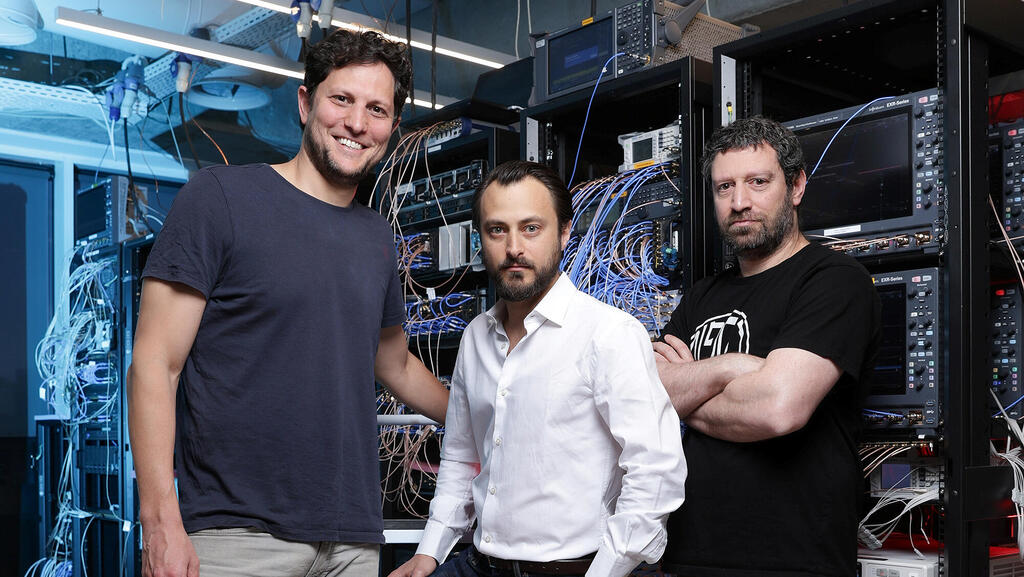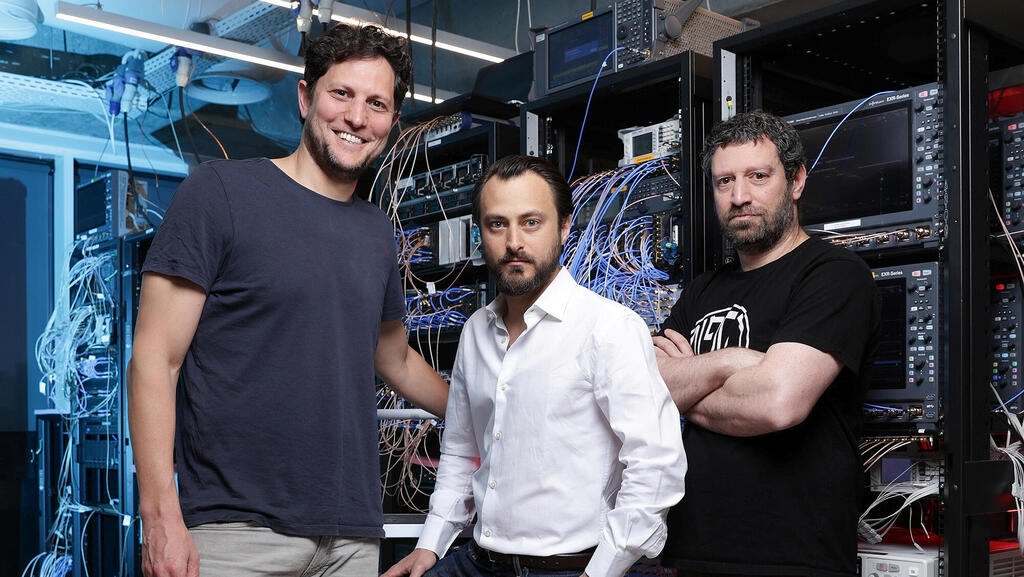
Most Promising Startups - 2025
“Quantum computing is the most important technological race of our generation. AI pales in comparison”
Israeli startup Quantum Machines, which is at the center of the global quantum race, says humanity may not be ready for what comes next.
"Humanity must not receive such enormous power all at once—it will destroy itself," warns Dr. Itamar Sivan, CEO of Israeli startup Quantum Machines, one of the world’s leading companies in the field of quantum computing.
See the full Top 50 Most Promising Startups 2025 list here
While global investment in quantum computing has soared into the billions—and the technology is no longer a far-off theory—Israel has joined the race with a national quantum initiative and the first domestic quantum computer built at Tel Aviv University. At the heart of this effort is Quantum Machines, co-founded by three PhDs from the Weizmann Institute, each a respected expert in the field. Quantum Machines was ranked in second position in Calcalist’s list of Israel’s top 50 most promising startups of 2025.
"We’ve been in quantum computing for many years, coming from academia," says Sivan. “The three of us earned doctorates at the Weizmann Institute, and for years the field was seen as something that might happen in 20 years—or never. But near the end of our doctoral work, we saw it was actually happening, thanks to breakthroughs like the first demonstration of quantum bit correction—done by one of our founders in 2016. We realized that quantum computing was transitioning from theory to industry, and that its tremendous computing power could soon be realized.”
“We developed the brain of the quantum world”
“As good entrepreneurs, we asked ourselves: what’s the biggest problem in this field?” Sivan continues. “We saw that everyone was focused on developing quantum processors—the ‘muscles’ capable of extraordinary computing power—but no one was building the ‘brain’ that activates those muscles. That’s a massive technological challenge. Solving it would not only speed up the realization of quantum computing but also create enormous economic value.”
Founded in 2018, Quantum Machines quickly gained traction. “After Silicon Valley discovered us, the quantum hype was in full swing,” Sivan recalls. “Our first investor, Rona \[Segev\] from TLV Partners, was the first to believe in a quantum computing startup in Israel.”
Asked whether Quantum Machines is truly “the brain of the quantum world,” Sivan responds, “It’s a good analogy. The processor is the strongest muscle, but without a brain to send commands, it couldn’t lift a feather. Ultimately, there are two key elements in computing: data, and the operations performed on that data. A quantum processor with just 300 qubits contains more data than a classical computer containing all the atoms in the universe. We connect to the processor and activate operations—run the algorithm—just like the brain sends signals to muscles. Our core technology is a processor that connects to the quantum processor and runs it. It’s implemented using FPGA (field-programmable gate array). Without us, a quantum processor can’t function.”
Related articles:
The quantum revolution is coming—but it must unfold slowly
Dr. Sivan estimates that it will take about a decade before quantum computers with millions of qubits are available, but emphasizes that current systems already have meaningful applications. “There are quantum computers today with tens to thousands of qubits that are actively being used or purchased. While they haven’t yet surpassed classical computers in general-purpose computing, we’re very close. In research applications, quantum computers already outperform classical ones by a huge margin. In commercial applications, I expect they’ll surpass classical systems within two to three years, after which we’ll start seeing broader adoption—and eventually, world-changing use cases.”
He also responds to Nvidia CEO Jensen Huang’s recent statement that the full potential of quantum computing won’t be realized for at least a decade. Sivan agrees—and adds a cautionary note: “That’s a good thing. If we suddenly unleashed the full power of quantum computing within a single year, it would be too much. Humanity would not be able to handle it. We’re already struggling with the power we currently hold. The power quantum computing will provide is on another scale entirely. It’s better for us to receive it gradually, in small, manageable doses.”
He offers a historical comparison: “When Alan Turing built the machine that cracked the Enigma code, imagine if he had instead introduced a modern supercomputer. Humanity wouldn’t have been able to digest such a leap. It’s better for this to arrive in a series of small explosions, rather than one that overwhelms us all at once.”
“The most important technological race of our generation”
“It’s very difficult to predict what will happen in a decade, but we are on the verge of a major breakthrough—computational power beyond comprehension,” says Dr. Sivan. “With a quantum computer, we’ll be able to perform in minutes what currently takes hundreds of thousands of years. People haven’t fully grasped this. For example, we’ll be able to develop new medicines in a fraction of the time.”
Asked whether quantum computing could also pose a threat, Sivan doesn’t hesitate. “Yes, and that’s why its adoption must be gradual. Humanity is being handed an unprecedented form of power—potentially a force for good, but equally destructive. God can create, but can also destroy. For this reason, quantum computing is the most important technological race of our generation. Artificial intelligence pales in comparison.”
Sivan adds that the geopolitical implications are profound. “China dominates the electric vehicle industry due to years of planning. But that’s nothing compared to what would happen if they are first to achieve quantum supremacy. This is bigger than a nuclear weapon—because unlike nukes, you can’t hide quantum computing. You could suddenly get your hands on it and take over the world through sophisticated, invisible means.”
Leading the industry—and aiming to become a "gorilla"
“Today, by every metric—customers, revenue, headcount—we’re one of the leading players in the industry,” says Sivan. “We have about 170 employees and will soon reach 200. Our growth is fast and substantial, and we expect it to accelerate even further. This won’t disrupt classic SaaS companies, because as quantum use cases expand, we’ll be increasingly essential.”
Quantum Machines’ technology is already deeply embedded across the ecosystem. “We’re involved in a large number of quantum computing projects worldwide. More than 50% of the companies in this space are our customers, and we play a cross-cutting role throughout the industry,” Sivan says.
He believes the company has the position and potential to become a “gorilla”—a dominant force not only in quantum, but across the broader tech landscape. “Our team and investors share that ambition. Remember, there was a time when Intel considered acquiring Nvidia. That gives you a sense of how long-term vision and strategic execution can reshape an entire industry.”
Ambitious fundraising to fuel further breakthroughs
“The company’s investors and leadership understand the magnitude of this opportunity—to become one of the leading players in the largest industry in the world,” Sivan says. “These kinds of opportunities don’t come around every year, or even every decade. That’s why we want to go all in to become that ‘gorilla’.”
He notes that the company is already a dual story: “We’re a business with significant current revenues and rapid growth—but we also have massive upside. That makes it a compelling financial opportunity. We haven’t yet decided whether to raise more capital, because we’re on track to profitability. But we have raised funds to fuel our next major breakthroughs.”
A new breed of supercomputer: DGX Quantum
To unlock the full potential of quantum processors, enormous classical computing power is also required. In response, NVIDIA and Quantum Machines jointly developed DGX Quantum, the world’s first hybrid system designed for integrated quantum and classical computing. It combines NVIDIA’s latest accelerated GPUs with Quantum Machines’ control technology.
This breakthrough platform is now part of the NVIDIA Quantum Center (NVAQC), enabling researchers and companies to develop hybrid applications and algorithms that seamlessly span both classical and quantum computing—connected by ultra-fast, high-bandwidth communication.
Building Israel’s quantum future
Quantum Machines is also behind the Israel Quantum Computing Center (IQCC), a world-class facility at Tel Aviv University, built with a NIS 100 million investment from the Israel Innovation Authority and Quantum Machines. The center serves academia, industry R&D labs, and global quantum researchers.
The IQCC provides access to a uniquely powerful hybrid system combining traditional supercomputers with quantum resources, all managed via Quantum Machines’ proprietary OPX control system. It offers prioritized, affordable access to Israeli institutions, while also being open to international researchers and developers.
Company ID
Sector: Quantum Computing
Established: 2018
Founders: Dr. Itamar Sivan, Dr. Yonatan Cohen, and Dr. Nissim Ofek
Employees: 180 employees, half of them in Tel Aviv and the rest in Denmark, Germany, Japan and the US
Funding: $280 million from PSG Equity, Red Dot Capital, Intel Capital, TLV Partners, Meron capital, and Avigdor Willenz
